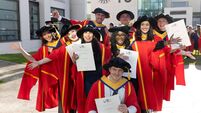Fr Liam Power: On Halloween and Richard Dawkins

Halloween originated from the ancient Celtic pagan festival of Samhain, traditionally celebrated at the onset of winter.
Approaching Halloween as I write, the sounds of fireworks pierce the night air. Kids, dressed as pint-sized goblins, ghosts or ghouls are preparing to patrol the neighbourhood, trick-or-treating on the doorsteps. Already in schools before the midterm break, they have anticipated Halloween with witch or ghost-themed fancy dresses and classrooms festooned with Halloween artwork.
Halloween originated from the ancient Celtic pagan festival of Samhain, traditionally celebrated at the onset of winter when the summer receded, and the days were getting shorter. The old Celts believed that the spirit world began to stir and, according to theologian and pastor William Bausch, the goblins and ghouls would work their mischief in the dark of night. Our Druid-inspired ancestors would offer these spirits treats so that they would not trick them. But these ancient Celts were a cunning lot. Bausch informs us that they began to disguise themselves as spirits from the other world hoping to fool the real spirits into leaving them alone. They would also steal the treats left out for the real ghosts.
When the Celts converted to Christianity, they ‘baptised’ as it were many of the ancient druidic customs and rituals. The doctrine of the Communion of Saints reminds us that we are all God’s people living and dead and are united in God’s love. Halloween is a time to remember our beloved dead. The pagan custom of appeasing the spirits of the dead is now a holy time of remembering them. Rather than frightening us they are friends who are near to us still. The Feast of All Saints is celebrated on November 1st. The evening before All Saints was designated as a holy or ‘hallowed’ eve. ‘Halloween’ is derived from this holy or hallowed time.
I imagine that most adults and children are not overtly conscious of the spiritual significance of the Halloween festival. But I often wonder if, even a highly secularised world in which faith and the spiritual dimension are often ridiculed or denied, playing Halloween games are indicative of a subconscious yearning for a deeper spiritual reality for which we are constantly searching.
I ask this question as the Helix Centre in Dublin prepares to host the famous scientist and (rather militant) atheist Richard Dawkins, who is on his final European tour. His two-night stint on November 15th and 16th is sold out, as is his show in the Ulster Hall in Belfast on the following night. Dawkins insists that belief in a God is delusional. According to him, there is absolutely no evidence whatsoever for the existence of a deity.
Dawkins has acknowledged that the machine code of genes is uncannily computer-like and that neither he (nor anyone else) has explained the origin of life which depends upon such digital information. Dawkins claims that there is no evidence of actual design - only the illusion or appearance of design in life. He bases his argument on the Darwinian theory of mutation. Random mutation, he claims, can explain away all appearances of design in life. Natural selection has the power to mimic a designing intelligence without itself being designed or guided in any way. It follows that there is no evidence for the existence of a designing intelligence (i.e. God) rendering belief in God delusional. He has persisted in asserting that the universe we observe has precisely the properties we should expect if “there is at bottom neither design nor purpose. This means we are not alone in a vast impersonal and meaningless universe the product of blind pitiless indifference.“
Such an extremely nihilistic perspective of life was reinforced by another famous scientist Stephen Hawking, whose research led him to conclude that there was a beginning to the universe. But he claimed that spontaneous creation, not a Creator God, is the reason there is something rather than nothing.
It would appear that both Dawkins and Hawking have had a hugely unwarranted influence on the perspective of millions of people, especially young people. At the same time, many scientists today such as Stephen C. Meyer acknowledge the return of ‘the God hypothesis.’ Meyer argues cogently that Dawkins and Hawking are inconsistent in their theses on the God delusion. He points out that they confuse the categories of science and philosophy. The laws of nature describe what happens in our world. They do not explain the origin of the universe as Hawking maintains.
Meyer claims that empirical evidence from the natural world points powerfully to the reality of a great mind behind the universe. “Our beautiful, expanding, and finely-tuned universe and the exquisitely integrated and informational complexity of living organisms bear witness to the reality of a transcendent intelligence, a personal God.”
He points out that unless the equations (that govern the ordering of the universe) exist in the mind of God and reflect God’s way of actively ordering the universe they have no objective existence independently of our minds. They are not things that can cause the origin of the universe.
I just wonder if behind the Halloween games and fun there is a subconscious protest against the nihilism of scientists like Dawkins and Hawking. Pope Francis, in his latest encyclical, reminds us of the wonderful consolation that comes from faith in a loving God.






